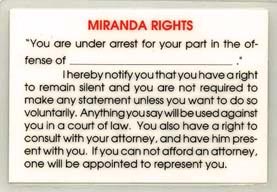
Thursday, April 30, 2009
Miranda v. Arizona
One of the countries largest and most well known cases still in use today is the case of Miranda v. Arizona. In 1963 a man named Ernesto Miranda was arrested in his home and convicted of rape and kidnap. The police questioned him for two and a half hours before he finally gave up, and signed a confession. Later, when he was convicted he revealed that he was unaware of his right to an attorney, or his right to avoid self-incrimination, because the police never informed him. Miranda brought his case to the court and eventually got his conviction overturned by the Supreme Court in 1966. Chief Justice, Earl Warren argued that police were violating the 5th amendment which states that nobody can be a witness to themselves. Warren also stated that in the situation that Miranda was in, it was intimidating, and he felt forced. After the decision, they could no longer use his confession as evidence in the case. The decision was 5-4, a landmark case in American history, changing the way that the legal system works today. Now, when a police officer is taking someone into custody, they are obliged to read the person their rights, known as the Miranda warning.


Subscribe to:
Post Comments (Atom)
Nice Job!! I feel bad for Ernesto for having to go through all that.
ReplyDeleteEven after the Supreme Court decision, when he was retried without his confession he was found guilty for the kidnapping and rape of an 18 year old girl. Nope I don't feel bad for him at all!
DeleteGood posting on such an important topic. It is well described and goes in a logical order, so it is very easy to read.
ReplyDeleteGreat Post! Goes right to the point and each sentence holds a gold mine of facts.
ReplyDeleteVery well written, simple and very informative.
ReplyDeleteYes, I agree. The Miranda Rights were a huge turning point in fighting crime. The power shifted away from the police because the arrested were informed that they could stay silent and have a lawyer.
ReplyDeleteGood post. Very accurate and to the point.
ReplyDeleteExcellent article, but I was wondering how Miranda ended up in the end? Hopefully guilty. But still, it's great that this case enforces our personal rights. I also like the picture with the text of the Miranda warning; it helps clarify just what exactly it guarantees us!
ReplyDeletehe was not guilty.
DeleteHe was found guilty based on a testimony from his wife whom he admitted the crime to.
DeleteVery well-done post. The image-text is very useful.
ReplyDeleteHowever, for reading purposes, I'd split it into smaller paragraphs. Just to make it easier to read.
~A.J.~